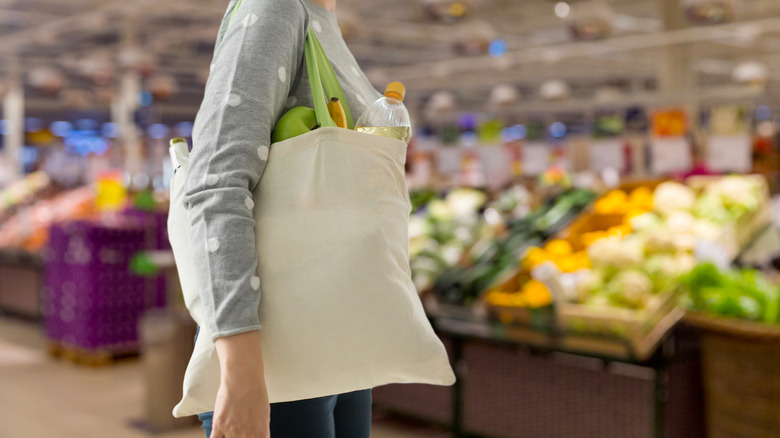How Often Should You Be Cleaning Your Reusable Grocery Bag?
According to National Geographic, "hundreds of billions of plastic bags" are used every single year in the United States. And unfortunately, plastic bags are almost never recycled and end up in landfills because they do not biodegrade. Plastic bags also sometimes end up in our waterways, harming wildlife in the process. Furthermore, plastics break down over time into microplastics, which have been found in "marine animals, farmland soil, and urban air." Because of this, a lot of people have started reusing their plastic bags or buying cloth bags to reuse, and some U.S. states have tried to help with the issue, even with a single-use bag ban in New Jersey.
Some people and businesses, such as Trader Joe's, use paper bags instead of plastic bags. National Geographic notes that a paper bag would have to be reused "three to 43 times" to counteract its effect on the environment; However, the fact that paper is recyclable and biodegradable makes it a better option than plastic. While reusing bags is a great way to reduce plastics in the environment and our carbon footprint, there may be an underlying health risk that can be easily avoided by simply washing your reusable bags.
Wash reusable bags after each shopping trip
Dr. Mark Reeves, a surgical oncologist, and Patricia Kelikani, a health journalist, spoke with Dr. Ryan Sinclair, an environmental microbiologist from Loma Linda University, about how dirty reusable bags actually are. Dr. Sinclair conducted a study where he and other peers swabbed reusable bags from random people walking into grocery stores in Arizona and California. The majority of people they asked said they had never washed their bags at all. Of all the reusable bags they tested, more than 99% showed signs of bacteria, with 51% testing positive for Coliform and 8% testing positive specifically for E. coli.
Kelikani explains Dr. Sinclair's findings by walking us through a grocery trip from a reusable bag's perspective: "[We] set [reusable bags] in the front seat of the grocery cart — the most contaminated surface you'll encounter on a trip to the store. Next we place these bags on the conveyor belt, another highly contaminated surface. Then we place them back in our trunks, a warm and cozy breeding ground for more bacteria, and right onto our kitchen counters."
Dr. Sinclair advises washing reusable bags after each shopping trip, and Dr. Reeves and Kelikani recommend washing only cotton bags by machine. Other materials, such as plastic, should be hand washed with warm, soapy water and hung to dry (via Real Simple). They also suggest using laundry detergent with disinfectants, such as peracetic acid. For organic options, Dr. Reeves says thyme oil is a great natural disinfectant.

